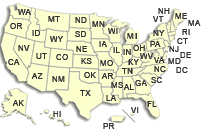Estimating the Magnitude and Frequency of Floods in Rural Basins of
North Carolina — Revised
Water-Resources Investigations 01-4207
By Benjamin F. Pope, Gary D. Tasker, and Jeanne C. Robbins
FULL TEXT
Abstract
A statewide study was conducted to develop two methods for estimating the magnitude and frequency of floods in rural ungaged basins in North Carolina. Flood-frequency estimates for gaged sites in North Carolina were computed by fitting the annual peak flows for each site to a log-Pearson Type III distribution. As part of the computation of flood-frequency estimates for gaged sites, new values for generalized skew coefficients were developed. Basin characteristics for these gaged sites were computed by using a geographic information system and automated computer algorithms. Flood-frequency estimates and basin characteristics for 317 gaged sites were combined to form the data base that was used for this analysis.
Regional regression analysis, using generalized least-squares regression, was used to develop a set of predictive equations that can be used to estimate the 2-, 5-, 10-, 25-, 50-, 100-, 200-, and 500-year recurrence interval discharges for rural ungaged basins in the Blue Ridge-Piedmont, Coastal Plain, and Sand Hills hydrologic areas. The predictive equations are all functions of drainage area. Average errors of prediction for these regression equations range from 36 to 65 percent.
A region-of-influence method also was developed that interactively estimates recurrence interval discharges for rural ungaged basins in the Blue Ridge-Piedmont and Coastal Plain hydrologic areas of North Carolina. Regression techniques are used to develop a unique relation between flood discharge and basin characteristics for a subset of gaged sites with similar basin characteristics. This, then, can be used to estimate flood discharges at ungaged sites. Because the computations required for this method are somewhat complex, a computer application was developed that performs the computations and compares the predictive errors for this method. The computer application also includes the option of using the regression equations to compute estimated flood discharges and errors of prediction specific to each ungaged site.
Root mean square errors, computed for each recurrence interval and hydrologic area, are generally only slightly lower for the region-of-influence method than for the regression equations and do not provide sufficient basis for recommending one method over the other. In addition, the region-of-influence method is a new method that is still being improved. As a result, the regional regression equations are considered to be the primary method for computing flood-frequency estimates at ungaged sites.
Citation:
Pope, B.F., Tasker, G.D., and Robbins, J.C., 2001, Estimating the Magnitude and Frequency of Floods in Rural Basins of North Carolina - Revised: U.S. Geological Survey Water-Resources Investigations Report 01-4207, 49 p.
|
For more information, contact |
To order printed copies, contact |
North Carolina Water Science Center
U.S. Geological Survey
3916 Sunset Ridge Road
Raleigh, North Carolina 27607
(919) 571-4000
E-mail
|
North Carolina Water Science Center
U.S. Geological Survey
3916 Sunset Ridge Road
Raleigh, North Carolina 27607
(919) 571-4037
E-mail
|
U.S. Geological Survey
Information Services
Box 25286, Federal Center
Denver, CO 80225
1-888-ASK USGS
|
|
